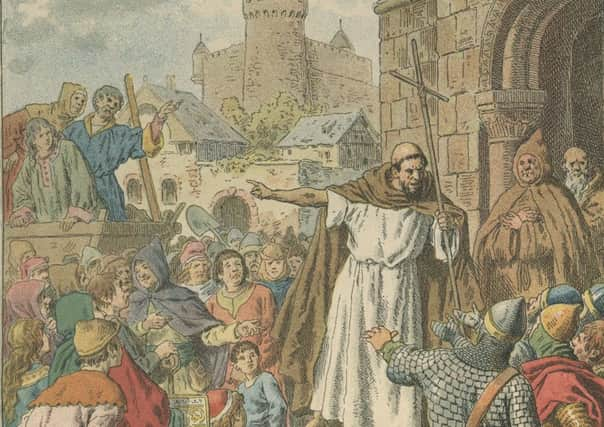Book review: Fields Of Blood, Karen Armstrong


Fields Of Blood
Karen Armstrong
Bodley Head, £25
It is by turns ingenious, impressively scholarly, wide-ranging and highly specific. It is a thesis with which I have a natural sympathy, and yet I found myself frequently frustrated, bemused and indignant.
On the positive side, Armstrong’s ability to range from China to Palestine and from Delhi to Dallas, and from the earliest moments of human history to its most recent atrocities, is a welcome counterbalance to the often blinkered accounts of religious developments peddled by the self-anointed “Four Horsemen Of Atheism”, Messrs Dawkins, Harris, Dennett and the late, lamented Hitchens. Armstrong has a far better grasp of the ambiguities and ambivalences of religious traditions, and how the behaviour of humans compared with the ideals espoused in religious texts is often so contradictory as to be almost schizophrenic.
Advertisement
Hide AdAdvertisement
Hide AdYet, the manner in which she argues invites accusations of circularity to say the least. Armstrong says that the earliest societies – those with an agricultural surplus and strong leaders unconcerned with the morality of acquiring it – had no concept of religion as a distinct and separate sphere of influence: politics, worship, tilling, praying, fighting and power were part of a single mind-set. But it’s a leap to go from deconstructing the idea of “religion” as separate, to saying it therefore didn’t exist, so therefore can’t be blamed, so must necessarily be exculpated. Armstrong is right – very right – to point out that all societies are founded on theft and intimidation, and that a systemic violence underpins and upholds the concept of civilisation itself. That we have science, art, culture, engineering, cities and philosophy at all is bought by the blood of billions of anonymous humans who died tens of thousands of years ago.
In order to wrestle with this problem, many societies developed the “Golden Rule” in the Axial Period. “Do unto others as you would be done to yourself” can be found in the thought of Buddha, Zoroaster, Plato, Isaiah and Confucius. Societies founded on violence sought to out-think violence. In some ways, Jesus is the most remarkable of these figures. The philosopher Simon Critchley, a non-believer, has called the morality of the Gospels “infinitely demanding” – and indeed it is. We all fail that test.
Armstrong makes a few snipes, such as claiming that the first emperor of China was responsible for the first inquisition, and that it was “secular”. Having argued there was no concept of religion, since it was all one mental landscape, it is odd that secularism seems to have jumped the gun conceptually. We can never, of course, know the heart of the tyrannical Qin Shi Huang, but I would be surprised if he were always crossing his fingers when he invoked the “Mandate of Heaven”.
As the book progresses towards modernity, via the Crusades (not religion, imperialism), Wars of Religion (not religion, politics) and suicide bombing (not religion, just unfortunate men who don’t really know much about religion), Armstrong makes some excellent observations – such as on the use of the word “religion” itself. Is it private or public? Is it a spur to action or a mask for more venal ambitions? In that regard, two things strike me as regrettable. There is no analysis of Russia in this otherwise internationalist picture, and the Mormon Church is never mentioned – despite its famous action against settlers heading towards Oregon on a date that would become famous later, 11 September.
Armstrong is, I feel, oddly coy about Protestantism. It is blamed for much, but its virtues are never discussed. Seen as a footstool to individualism and self-interest, it is strange not to have discussions of the anti-fascist Dietrich Bonhoeffer, or the Scottish Covenanters, who opposed state and elite interference in matters of faith. The idea that Protestantism put religion into the realm of the private and therefore allowed a free-for-all of interpretation has some traction, but it neglects the state-building and community-forming aspects of the Reformation.
Armstrong is, on one level, absolutely correct. Flying a plane into a building has as little to do with Islam as starving, enslaving or beheading people has to do with liberty, equality and fraternity. Religion has given a dark and self-justifying cast of mind to many of the world’s conflicts, but it has also offered alternatives (whereas none could be found for Nazism, for example). In a way this reminds me of a reprimand an old teacher once gave me: right answer, but you got to it the wrong way.